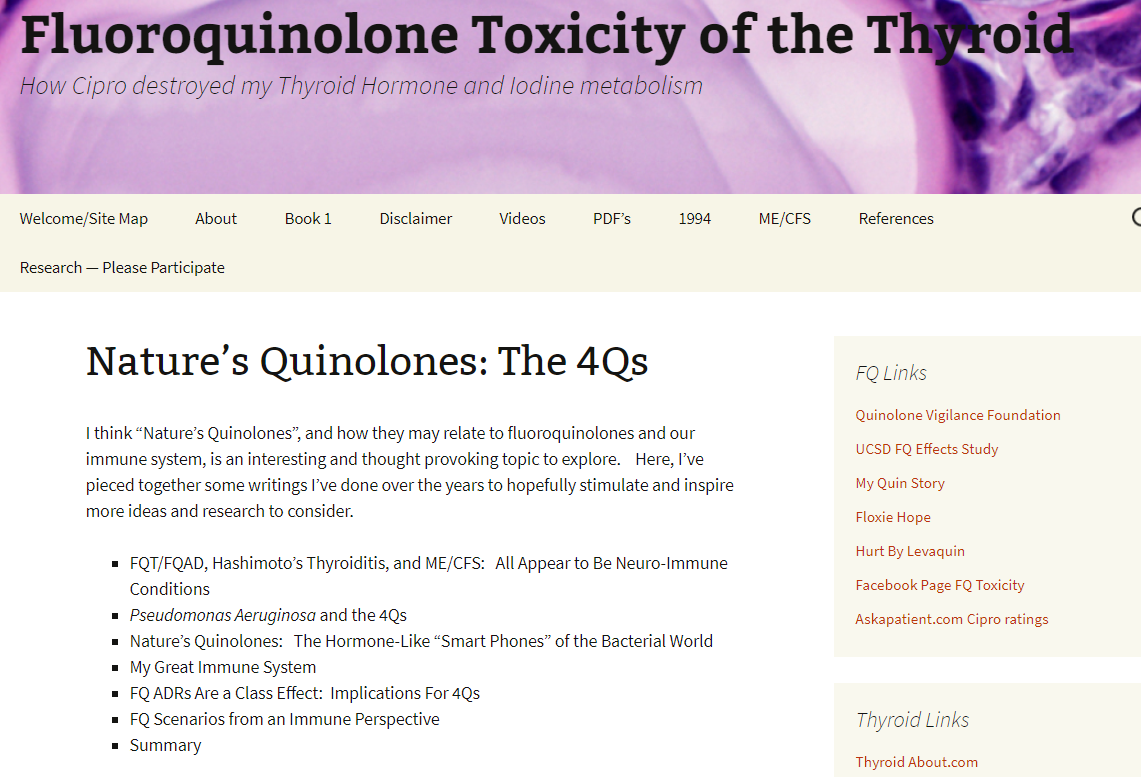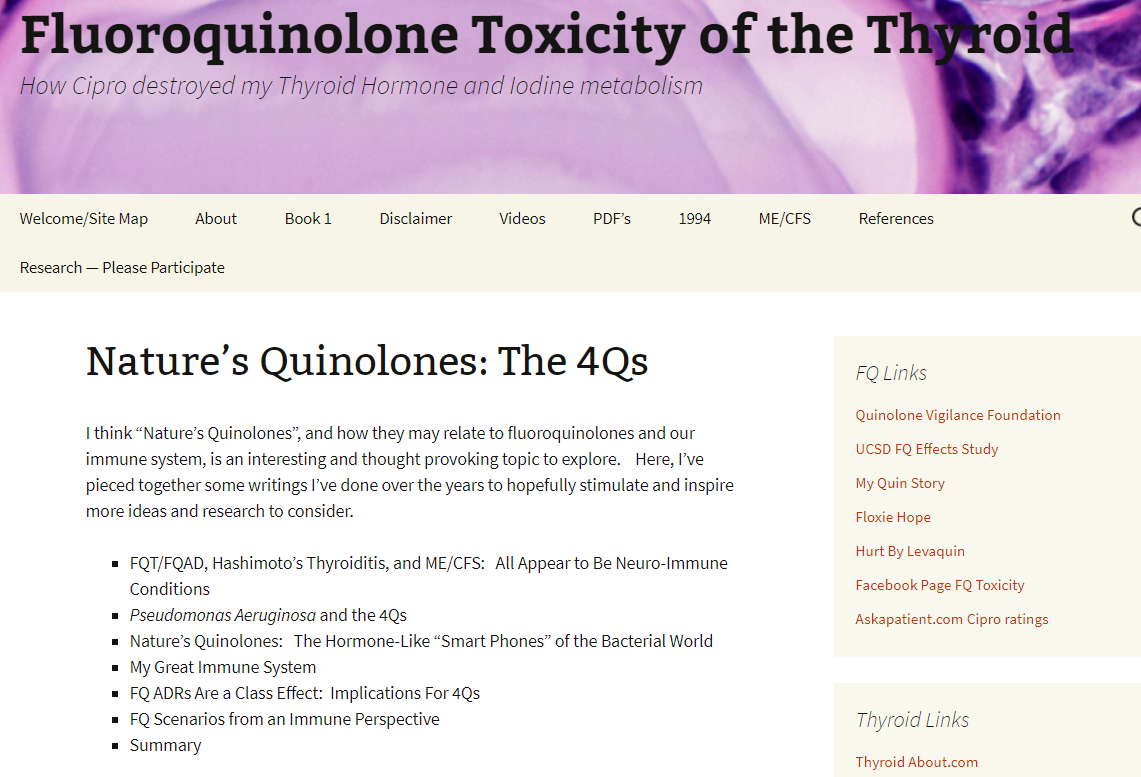Why do some people have relapses of their fluoroquinolone toxicity symptoms? Why is fluoroquinolone toxicity an ongoing illness–a syndrome–and not a one-time event that ends once the drug is metabolized? Why do people seem sensitized after suffering from fluoroquinolone toxicity–with exposures to things that would be benign to healthy people throwing them into a relapse? Why does fluoroquinolone toxicity seem more like an autoimmune or neuroimmune disease than a drug allergy? What does fluoroquinolone toxicity have in common with autoimmune or neuro-immune diseases?
These are all perplexing questions about FQT/FQAD that currently we have no answers for. On the
website http://fluoroquinolonethyroid.com/ many ideas about possible mechanisms regarding some
of these questions are explored (here, here, and here). I found the most recent of these posts,
entitled Nature’s Quinolones: The 4Qs, to offer additional thought-provoking and insightful new
ideas to consider when thinking about questions like these.
This post is a summary of Nature’s Quinolones: The 4Qs, to share the information in it with the
Floxiehope.com audience. There is information in the original article that I won’t be covering in this
post, and I hope this summary inspires you to read more about the details in the original article. I
also hope that any researchers reading this will check out the original article, as it provides a more
comprehensive explanation, along with numerous references, that may be of use in your thought
processes about this topic.
********
There is a bacteria that is ubiquitous in our environment called Pseudomonas aeruginosa, or P. aeruginosa. P. aeruginosa is everywhere, including, “soil and water, lakes, streams, rivers, other fresh water, potable water, and sources such as sinks, showers, and hot tubs.” People with healthy immune systems deal with P. aeruginosa without incident. However, P. aeruginosa is a pathogen associated with hospital-acquired infections in immune-compromised individuals, and perhaps it may also be possible that some people have immune systems that over-react to to the bacteria, or its byproducts.
Like many other bacteria and some fungi, P. aeruginosa “communicate” with each other via something called Quorum sensing (QS). The P. aeruginosa QS molecules are able to turn bacterial genes on and off, such as instructing the bacteria to form biofilms under certain circumstances. Just as people with normal immune systems interact with P. aeruginosa without incident, people with normal immune systems also interact with the P. aeruginosa QS molecules without incident.
However, one of the possible ideas explored in Nature’s Quinolones: The 4Qs is that people who have been “floxed” may not react to the P. aeruginosa QS molecules without incident. Rather, perhaps they may be sensitized to the P. aeruginosa QS molecules, and their immune-system attacks these molecules, causing a potential autoimmune/neuroimmune reaction.
Why might “floxies” have an immune-system over-reaction to P. aeruginosa QS molecules?
Because one group of QS molecules that P. aeruginosa QS makes are actually quinolones–“nature’s quinolones” (heterocyclic 4-quinolone/quinolines – abbreviated the “4Qs”). These 4Qs produced by P. aeruginosa share the basic 4-quinolone backbone of the commercially synthesized quinolone antibiotics. (More information about this can be found in Nature’s Quinolones: The 4Qs, as well as the articles linked-to in the post, including 4-Quinolones: Smart Phones of the Microbial World.)
I don’t know about you, but this BLEW MY MIND.
The production of natural quinolones may answer the question – why do people have ongoing reactions to fluoroquinolone antibiotics that last long after the drugs “should” be out of their system? Could it be because they are constantly being re-exposed to quinolones in our environment–through a common bacteria producing them to communicate with other bacteria? Could it be that Fluoroquinolone Toxicity is an ongoing syndrome because it is an immune reaction (and/or sensitization) to chemicals that are ubiquitous in our environment?
Again, these are just possible ideas the author of Nature’s Quinolones: The 4Qs is exploring, but it MAKES SO MUCH SENSE.
QS Qinolones act as “signaling molecules for other bacteria. FQs also act as “signaling molecules” within us. In particular, they seem to target cytokines, which are heavily involved in the signaling and amplification system in our immune systems.” Pharmaceutical fluoroquinolones are given in a large enough doses that perhaps they may signal the immune system to over-react–especially to the presence of other quinolones. Nature’s Quinolones: The 4Qs describes some possible mechanisms through which fluoroquinolones may affect the immune system, providing numerous references in additional links in the article supporting this. Fluoroquinolones (and/or the 4Qs if production in larger amounts due to severe infection such as sepsis, for example) may also trigger epigenetic “switches” to be “flipped” in the immune system, causing a change that leads to a constant over-reaction to quinolone molecules.
The author of Nature’s Quinolones: The 4Qs ponders:
“I wonder if some of my existing natural antibodies were “switched on” in a major way, leading to global or specific hypersensitivities. And based on what I now know about FQs acting as ‘signaling molecules,’ I’m guessing that one or more of my cytokines or receptors were hit especially hard by what my body perceived as a whopping dose of quinolones.”
An over-active immune system that is hyper-sensitive to minute amounts of molecules that are harmless, and even unperceived, to people with normally functioning immune systems, is not unheard-of. Many people with ME/CFS believe they have autoimmune/neuroimmune reactions to tiny molecules of mold, and even minuscule amounts of mold appear to make them severely ill. Common allergies are also a result of an over-sensitized immune system:
“If this seems like an extreme leap to make, consider, for example, two very common allergies: hay fever and peanut allergies. There are microscopic particles of pollen and dust floating around in the air that most of us never see, feel, are aware of, or react to – unless you’re a person with hay fever allergies. There are microscopic proteins and aflatoxins in peanuts that most of us never see, feel, are aware of or react to – unless you’re a person with a peanut allergy. The first allergy typically leaves people with itchy and runny eyes and nose. The second allergy can result in anaphylaxis and even death. The point being, it doesn’t take much of these substances to make a person miserable or even kill them – if they’re hypersensitive.”
Might some people suffering from fluoroquinolone toxicity be sensitive to minute amounts of quinolones in the environment? Might some people who live in more humid and moist environments, for example, have increased exposure to quinolones by P. aeruginosa QS molecules? Additionally, might the fluoroquinolones have made epigenetic changes to the immune systems of those suffering from fluoroquinolone toxicity that make them have autoimmune/neuroimmune-like reactions to quinolones, including the 4Qs? Again, it makes all the sense in the world to me, but it needs to be examined by someone with the capacity to test these ideas.
If fluoroquinolones change the genetic on/off switches in our immune systems, how do we flip those epigenetic “switches” again? That’s a very good question that I don’t know the answer to. Our environment is constantly affecting our genes though, and epigenetics is a burgeoning field of research. I’m hopeful that scientists will find targeted ways to flip gene switches. I’m also hopeful that, in the meantime, changes in your environment (eating healthy foods, reducing stress, supplements, etc.) may help you (the “floxie” reading this) to “switch” your immune system back to where you were pre-flox so that your body is not over-reacting to nature’s quinolones (if that’s occurring). I know that my body is not in a state of constant reactivity, and, as always, I hope that my recovery gives others hope for their recovery.
********












… [Trackback]
[…] Information on that Topic: floxiehope.com/quinolones-in-our-environment/ […]
… [Trackback]
[…] There you can find 7364 more Info to that Topic: floxiehope.com/quinolones-in-our-environment/ […]
… [Trackback]
[…] Find More here to that Topic: floxiehope.com/quinolones-in-our-environment/ […]
… [Trackback]
[…] There you can find 37166 additional Information on that Topic: floxiehope.com/quinolones-in-our-environment/ […]
… [Trackback]
[…] Find More Info here to that Topic: floxiehope.com/quinolones-in-our-environment/ […]
… [Trackback]
[…] Find More Info here on that Topic: floxiehope.com/quinolones-in-our-environment/ […]
… [Trackback]
[…] Read More on that Topic: floxiehope.com/quinolones-in-our-environment/ […]
… [Trackback]
[…] Here you can find 82247 additional Information on that Topic: floxiehope.com/quinolones-in-our-environment/ […]
… [Trackback]
[…] Read More Info here on that Topic: floxiehope.com/quinolones-in-our-environment/ […]
… [Trackback]
[…] Find More to that Topic: floxiehope.com/quinolones-in-our-environment/ […]
… [Trackback]
[…] Read More Info here on that Topic: floxiehope.com/quinolones-in-our-environment/ […]
… [Trackback]
[…] Find More to that Topic: floxiehope.com/quinolones-in-our-environment/ […]
… [Trackback]
[…] There you can find 63868 more Info on that Topic: floxiehope.com/quinolones-in-our-environment/ […]
… [Trackback]
[…] Read More Information here on that Topic: floxiehope.com/quinolones-in-our-environment/ […]
… [Trackback]
[…] Info to that Topic: floxiehope.com/quinolones-in-our-environment/ […]